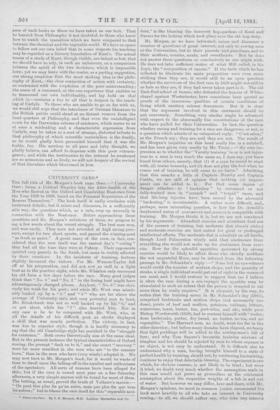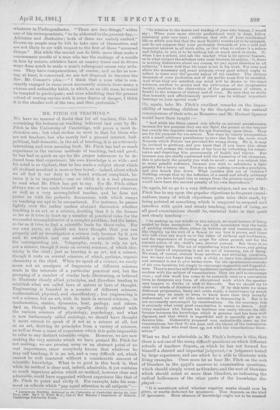UNIVERSITY OARS.*
Tux full title of Mr. Morgan's book runs thus :—" University Oars : being a Critical Enquiry into the After-health of the Men who Rowed in the Oxford and Cambridge Boat-race from the Year 1829 to 1869, based on the Personal Experience of the Rowers Themselves." The book itself is sadly overladen with
irrelevant details; but it raises and discusses, in a sufficiently able way, the questions which, as a rule, crop up annually in connection with the Boat-race. Before approaching these questions and Mr. Morgau's solutions of them, we propose to say a few words about the recent struggle. The best men won, and won easily. They were not extended. at high racing pres- sure, except for two short spurts, and passed the wiuning-post " as fresh as paint." A great many of the crew, in fact, con- sidered that the race itself was the easiest day's " outing " they had all the time they were at Putney. Their opponents spurted very gamely to the finish, but came in visibly affected by their exertions. In the incidents of training, fortune slightly favoured the victors. For Mr. Watson-Taylor fell off at his preparation, and did pot row so well in a light boat as in the practice eight, while Mr. Wharton only recovered his old. form a few days before the race. Many good judges think that " No. 6 " and " No. 2 " in the losing boat might have advantageously changed places. Anyhow, " No. 6" was obvi- ously too weak for his post ; and while Mr. West was admir- ably backed up by a " 5 " and " 6 " who are far above the average of University oars, and very powerful men to boot, Mr. Brooksbank was not so well backed up by his " 6," and so got short, while his " 7 " also hurried. him, Nor in any ease is ho to be compared with Mr. West, who, in all the details of his difficult post as stroke displayed a skill that was nearly perfection. The victory, in fact, was due to superior style, though it is hardly necessary to say that the old Cambridge style has perished in the "struggle for existence." Both crews theoretically aim at the same ideal. But in the present instance the typical characteristics of Oxford rowing, the prompt "dash on to it," and the smart " recovery " were far more manifest in the men who are " to the manner born," than in the men who have (very wisely) adopted it. We may now turn to Mr. Morgan's book, for it would be waste of time to dwell upon the falling-off in the number and enthusiasm of the spectators. All sorts of reasons have been alleged for this ; but if the race is rowed next year on a fine Saturday afternoon, a very simple answer will be found for most, of them. The betting, as usual, proved the truth of Voltaire's maxim :- " On pent titre plus fin qu'un autre, mail pas plus fin que toes lee entree ;" but to blame the race itself for this" separable acci-
• Unlrerstly Oars. Ay J. E. Morgan, M.D. London; Macmillan and Co. dent," is like blaming the innocent hop-gardeu.s of Kent anal Sussex for the betting which took place over the old. hop duty.
Mr. Morgan, as we have intimated, raises and discusses a' number of questions of great interest, not only to rowing men• at the Universities, but to their parents and guardians, and to their mothers, cousins, aunts, and sweethearts. But ho does not answer these questions so conclusively as one might wish. He does not take sufficient notice of what Mill called, iu his Logic, the " composition of causes." if the facts which he has. collected to illustrate his main proposition were even more, striking than they are, it would still be an open question. whether the survivors of the first race in 1829 might not still be as hale as they are, if they had never taken part iu it. The old East-End school of boxers, who defended the honour of White- chapel against Westminster, have sometimes been quoted as proofs of the innocuous qualities of certain conditions of living which sanitary science denounces. But it is clear that the argument involved in this statement should be put conversely. Something very similar might be advanced with respect to the abnormally fine constitutions of the men, who have pulled for their Universities. In fact, the question. whether racing and training for a race are dangerous, or not, is a question which admits of no categorical reply. " C'est scion," as the French say ; they aro, and they are not. The result of Mr. Morgan's inquiries on this head really lies in a nutshell, and has been given very neatly by Mr. Tiun6 :—" My own im- pression as to whether the "Varsity training ' is or is not injur- ious to a man is very much•the same as, I dare say, you have heard from others, namely, that (1) if a man be sound to start with, (2) trains honestly, and (3) does not play the fool when he' comes out of training, he will come to no harm." Admitting- that this smacks a little of Captain Bunsby and Captaiw Cuttle, we are still of opinion that nothing (of import- ance) can be added to it. For that some degree of danger attaches to " bucketing " by untrained or not fully-trained men in " scratch " and "torpid" races, and that life-long injuries have , been caused by the aforesaid " bucketing," is incontestable, A rather more difficult, and,. perhaps, more interesting question, is how far Dr. Arnold's desiderated union of -/v,c4saureoi and tcotiorxv) is compatible with training. Mr. Morgan thinks it is, but we aro not convinced by his arguments. Abundant exercise and abundant food. are- of the essence of training, but moderate diet (tenitis victims). and moderate exercise are best suited for great or prolonged intellectual efforts. The moderate diut is admitted. on all hands,. though Lord Palmerston wisely said that abstinence from everything else would not make up for abstinence from exer- cise. How far the splendid appetites generated by strong exercise would be likely to affect those who strictly meditate the not ungrateful Muse, may be inferred from the following passage in Mr. Schneider's reply :—" None but an eye-witness• would credit the number of mutton chops, and the quantity of steaks, a single individual would put out of sight in the course o5 one meal, and I would venture to suggest that (as I believe is often the case during a sea-voyage) the appetite may be• stimulated to such an extent that the person is tempted to eat more than he really requires." It is pleasant, by the way, to notice that the training menu in Mr. Schneider's day (1865),. comprised beefsteaks and mutton chops (not necessarily un-- done), joints of beef and mutton, potatoes, cabbage, lettuce, watercress, toast, butter, tea, port-wine, and ale; while poor Bishop Wordsworth (1829), had to content himself with" under- done beefsteaks, porter, dry bread, no butter, no tea, and ne. vegetables." The Harvard. men, no doubt, went too far in the other direction ; but before many decades have elapsed, we fancy that light puddings will be added to the rowing-man's bill of fare; and why Tom Sayers's favourite training mixture of isinglass and tea should be rejected by men to whom expense is no object, is not easy to understand. It is difficult also for understand. why a man, having brought himself to a state of perfect health by training, should not, by continuing his training, continue to enjoy that delectable blessing. The experiment is one which, for obvious reasons, is not likely to be tried ; but were, it tried, we doubt very much whether the assumption made in this case would not prove as groundless as the celebrated assumption about the respective weights of a fish in and out of water. But however we may differ, here and there, with Mr- Morgan's opinions, we must in common justice, recommend his book most heartily to all who take an interest in University rowing,—to all, we should rather say, who, take any interest
whatever in Undergraduates. "There are two things," writes one of his correspondents, "to be abhorred in the present day,— Athletics and lEsthetics ; both of them are unduly exalted." Grown-up people may be left to take care of themselves, and are not likely to err with respect to the first of these "accursed things." But while the second can do little more than make a consummate noodle of a man who has the makings of a noodle in him by nature, athletics have at sundry times and in divers ways done mach to make a man's subsequent career very ardu- ous. They have compensations, of course, and so far as row- ing, at least, is concerned, we are not disposed to traverse the Rev. Mr. Conant's plea :—" I think that a man who is con- stantly engaged in races must necessarily abstain from many a vicious and unhealthy habit, iu which, as an idle man, he would be tempted to participate ; and even admitting that the present school of rowing carries with it some degree of danger, I think it is the slnaller evil of the two, and thus preferable."



































 Previous page
Previous page